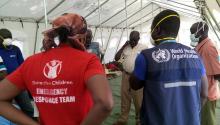WHO supports response to the suspected meningitis outbreak in Torit County, South Sudan
Juba, 28 February 2018 – Insecurity notwithstanding, the World Health Organization (WHO) has moved to support a rapid response to investigate reports of suspected meningitis deaths in Kor Mush, Nyara East and Nyara West villages located in Imurok and Iyire payams in Torit County, former Eastern Equatoria State.
So far, a total of 34 suspected cases with 15 community deaths have been registered, of which 23 cases and 9 deaths were reported in Iyire Payam, and 11 cases and 6 deaths in Imurok Payam. These two locations have largely been inaccessible because of insecurity. More alerts have been received in the last 24 hours and these are being investigated by the response teams and vetted against the standard case definition for meningitis.
WHO is supporting the Ministry of Health efforts in strengthening overall coordination of the response at state and county level, technical personnel have been deployed to scale up case investigations and active surveillance, sample collection, case management, Infection Prevention and Control, and risk communication. At state level, the task force has been reactivated with the support of WHO and partners to manage the suspected outbreak. WHO prepositioned medical supplies including antibiotics, investigation kits and other case management supplies to Torit County. So far three samples have been collected and are being tested at the National Public health laboratory in Juba. WHO is supporting the state Ministry of Health to conduct a detailed epidemiological investigation and risk assessment to guide the response strategy and plan.
Dr Guracha Guyo, the WHO Emergency Coordinator, stressed that Torit County is one of the high-risk states that remain vulnerable to meningitis outbreaks. It therefore critical to ensure that these suspected cases are thoroughly investigated, tested and control/ risk mitigation measures instituted.
South Sudan like the other twenty-six Countries in the ‘meningitis belt’ of Africa, remains prone to major meningitis epidemics that have claimed many lives and causing serious strain on health services. The last meningitis outbreak in South Sudan was in May 2013 in Malakal. A preventive MenAfric Conjugate A vaccination campaign was conducted in Eastern Equatoria state in April 2016. Torit County was among the counties that scored a suboptimal coverage of 83%, which was below the desired coverage of 95%. Other counties that had low coverage include Ikotos (55%), Kapoeta East (79%), Kapoeta North (77%) and Magwi (73%). The implication is that there is sufficient pool of susceptible individuals in Torit and neighboring counties (especially Magwi and Ikotos) and this can lead to further transmission of the disease.
Thanks to Gavi Alliance with whose support the MenAfrvac campaigns have been made possible”, said Mr Evans Liyosi, WHO Representative a.i. to South Sudan. The mass vaccination campaign which started in April, 2016 when completed this year will protect over 5 million South Sudanese.
The vaccine is meant to protect people between 1-29 years against the Neisseria meningitidis A serogroup for ten (10) years. It will protect children as young as one; and it is expected to both protect children from the disease for significantly longer periods as the vaccine will reduce infection and transmission and in turn protect the larger community, including family members and others who have not been immunized.
Fore more information, please contact:
Dr Argata Guracha, email: guyoa [at] who.int, Tel: +211956268932
Dr Ramadan Otim, email: ramadano [at] who.int, Tel:+211916097828

